When it comes to health care reform, Hillary Rodham Clinton epitomizes the old adage, "once burned, twice shy."
As first lady in the early 1990s, she tried to reshape the nation's health care system - an audacious effort that collapsed under its own complexity, Republican opposition and the Clintons' unwillingness to seek compromise with lawmakers.
"I still have the scars to show for it," she tells voters now, promising a more consensus-based approach to health care reform if she is elected president.
But that newfound caution has also come with a price. While rivals Barack Obama and John Edwards have both laid out sweeping health care reform plans with estimated costs attached, Clinton has so far proposed only modest changes to the existing system while avoiding the vexing question of how to provide coverage for all.
Hard lessons learned
With some 47 million Americans lacking health insurance, the issue has become an urgent priority for Democratic primary voters and for organized labor, a major party constituency. Activists say the time for caution is long past and they want answers from Clinton, the Democratic front-runner.
"One of the problems with being last out of a gate is that it's hard to be seen as leader," said Robert Borosage, president of Campaign for America's Future, a liberal think tank advocating universal coverage. "She has a lot of credibility for taking scars the last time, but she's got a lot of doubters, too. She needs to step up to the bat."
Clinton now says she's learned the hard lessons of 1993, when her husband ignored naysayers and tapped her to lead the President's Task Force on National Health Care Reform.
Toiling behind closed doors with a group of some 500 experts from academia, business and the medical profession, the first lady sought to create a system of "managed competition." Employers, some subsidized by the government, would be pushed to expand health insurance to their workers. Insurance companies would be required to compete for business, thereby reducing costs.
The effort was controversial from the start. Members of Congress complained they were excluded from the process, while Clinton's insistence that the task force meet in secret was successfully challenged in court.
The final plan, more than 1,300 pages long, was decried by Republicans and health care interest groups as socialized medicine and government intervention run amok. The Health Insurance Industry of America ran a devastating $30 million television ad depicting a middle class couple - "Harry and Louise" - puzzling over the plan's complexities and worrying about losing the right to choose their own doctors.
'School of small steps'
The plan was declared dead in late 1994, just weeks before midterm elections that would hand Republicans control of both the House and Senate. Democrats blamed their losses in part on the health care debacle, and Bill Clinton spent his remaining years as president battling a Republican majority on Capitol Hill.
Burned by the experience, Sen. Clinton has since adopted what she calls "the school of small steps."
Aides say her plan will be rolled out through a series of speeches focusing on different aspects of health care reform, with the topic of universal coverage to be tackled last.
She began last month with a speech on reducing health care costs. Among other things, she called for enhanced computerized medical record-keeping and encouraging insurance companies and providers to emphasize prevention of illness, rather than treatment.
Her second address, on improving health care quality, will come later this summer.
Competing proposals
Whatever she proposes will be immediately compared to the Edwards and Obama plans, both of which have been generally praised by activists. But analysts say Clinton can take advantage of her late entry in the debate by combining the best elements of her rivals' plans while avoiding the points that have drawn criticism.
"After the searing experience she's had on health care, she's intent on reassuring voters she's a moderate Democrat on the issue," Yale University political scientist Jacob Hacker said. "I just fear her campaign policy folks are trying to come up with a perfect mix, threading the needle between left and right."
Central to Edwards's plan is a so-called "individual mandate," requiring everyone to have health insurance the way most states require drivers to have auto insurance. Employers would have to insure their workers or pay into a government program that would provide coverage.
Edwards has estimated his plan could cost as much as $120 billion per year, paid for by repealing tax cuts for individuals making more than $200,000. The hefty price tag has raised eyebrows and prompted Clinton to be openly skeptical about investing even more tax money into a dysfunctional system.
Like Edwards, Obama's plan retains the employer-based insurance system and creates a public plan to expand coverage. But his plan does not include an individual mandate, leading critics to say it falls short of offering truly universal coverage.
The Illinois senator has defended the plan, arguing that until the cost of coverage is vastly reduced, many consumers wouldn't be able to buy insurance even if they were required to do so.
Hacker, who has consulted with the major Democratic candidates on their health care plans, said rather than craft a plan radically different from her rivals, Clinton should use her political heft to create a national movement around the issue.
"She could come at this with a pragmatic message about the economic cost of a failure to act," he said. "She could say 'We need to do more than outline policy solutions - we need to bring Americans together.' It'll be quite a jujitsu move if she can pull it off, but she should do it very soon."
